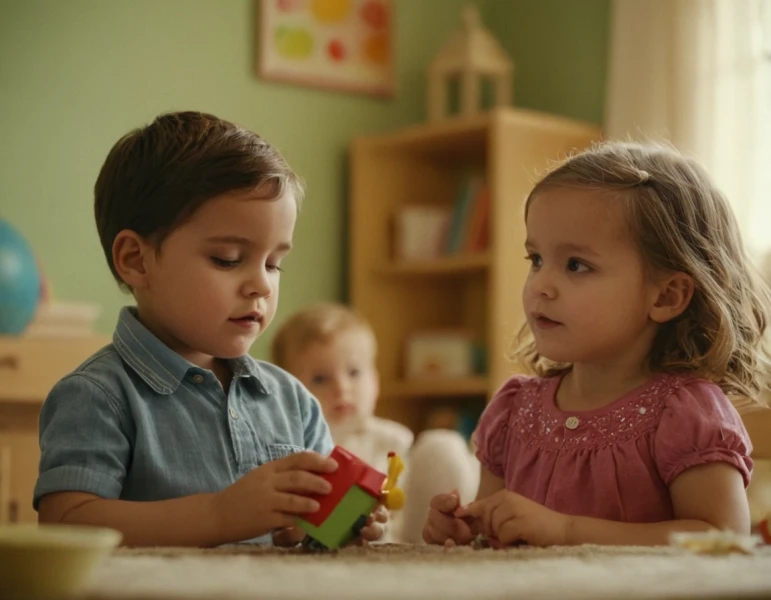Educa UNIVERSITY|EDUCATION
Early Childhood Education: The Basis for Learning
Related Masters
Early Childhood Education: The Basis for Learning
Hello! I'm Carlos Hidalgo, and today I want to talk to you about a subject that I am deeply passionate about: childhood education. I have dedicated an important part of my life to teaching and understanding how the little ones learn and develop. So feel comfortable and join me on this journey through a world where creativity and learning intertwine in a unique dance.
What is Early Childhood Education?
Early Childhood Education is the first stage of the education system, and covers children from 0 to 6 years old. This stage is divided into two cycles: the first, ranging from 0 to 3 years, is carried out in nurseries; and the second, covering 3 to 6 years, is provided in schools. The importance of this stage cannot be underestimated, as it lays the foundation for children's academic and social future.

The Cycles of Early Childhood Education
First Cycle (0 to 3 years):
- Objectives: Encourage autonomy, knowledge of the environment and language development.
- Methods: Through play, children explore their environment and develop fundamental skills.
- Objectives: Continue the development of social and emotional skills, as well as cognitive skills.
- Activities: More structured games and activities that encourage critical thinking and problem solving are included.
Second Cycle (3 to 6 years):
Why is Early Childhood Education Important?
Early childhood education is not just about teaching children to read and write. It is about providing them with a safe and stimulating environment where they can explore, discover and grow. Investing in this stage is crucial, as it directly impacts children's emotional, social and cognitive development.
Long-Term Benefits
- Comprehensive Development: Children who receive quality early childhood education develop better social, emotional and cognitive skills. This helps them face challenges in the future.
- Reducing Inequalities: Early education provides equal opportunities, allowing all children, regardless of their background, to access quality learning
- School Readiness: Early childhood education lays a solid foundation for primary education, helping children better adapt to the school environment.
- Creating an environment where children feel safe and valued is essential. A positive environment fosters curiosity and a love of learning.
- Play is the primary means through which children learn. Through play, children develop social, cognitive, and motor skills. Educators should design play activities that stimulate creativity and critical thinking.
- Early childhood educators must be trained not only in pedagogy, but also in how to work with families to support children's development. An engaged educator can make a difference in a child's life.
- It is critical to address diversity in the classroom. Educators must be prepared to adapt their teaching to the needs of all children, promoting an inclusive environment that celebrates differences.
- Education does not end with a degree. Continuing education allows educators to update their knowledge and practices.
- Involving parents and caregivers in the educational process is crucial. Families must be seen as partners in their children's education.
- It is important to constantly evaluate teaching methods and children's progression. Feedback from parents and other educators can provide valuable insights.
- Implementing projects that integrate diverse areas of knowledge can result in rich and meaningful learning experiences for children. For example, a project on nature can include art, science, and language.
- Pacience and Empathy: Understanding the emotions and needs of each child is essential to create an effective learning environment.
- Creativity: The ability to innovate and adapt activities to children's interests is key to maintaining their attention and enthusiasm.
- Organization: Keeping a classroom organized and structured helps children feel confident and know what to expect in their day-to-day lives.
The Keys to Success in Early Childhood Education
1. Positive Environment
2. Games as a Learning Tool
3. Trained Educators
4. Inclusion and Diversity
How to Boost Good Early Childhood Education
As an educator, I have observed that there are several strategies to boost early childhood education:
Continuing Education for Educators:
Collaboration with Families:
Evaluation and Improvement:
Learning Projects:
The Role of the Early Childhood Educator
An early childhood educator not only teaches, but also acts as a guide and role model. Here I share with you some of the qualities I consider fundamental:
Conclusion
Early childhood education is more than just a step in the education system; it is a crucial stage that lays the foundation for lifelong learning and development. Investing in early childhood education is investing in a brighter future for our children and our society. As we move forward into an increasingly complex world, early childhood education will continue to be a fundamental pillar in the formation of capable, responsible and creative individuals.
Investing in early childhood education is an investment in a brighter future for our children and our society.
Faculties
Trainings
The faculties embrace diverse academic disciplines and fields of study, opening doors to new perspectives and exploring different spheres of wisdom in a constantly evolving world.














